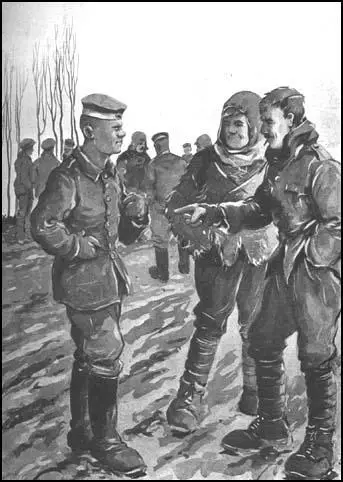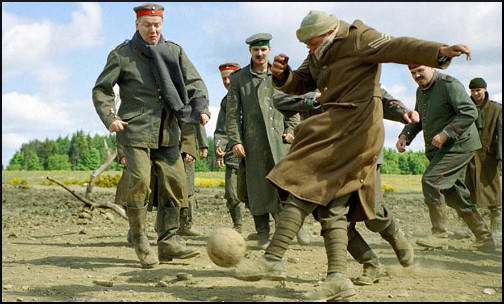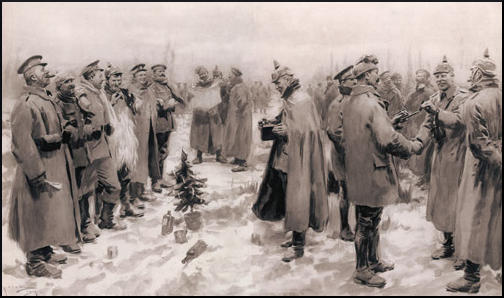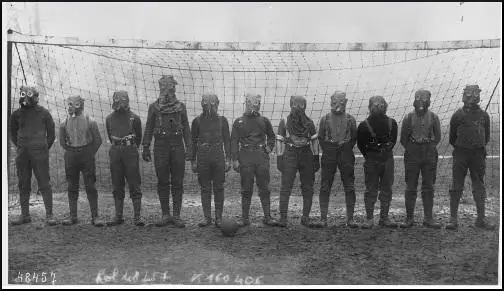Classroom Activity on Football on the Western Front
On the Western Front in December 1914 there was a spontaneous outburst of hostility towards the killing. On 24th December, arrangements were made between the two sides to go into No Mans Land to collect the dead. Negotiations also began to arrange a cease-fire for Christmas Day. Edward Hulse, a Lieutenant in the Scots Guards, received a message from the Germans suggesting a five day period without war.
On other parts of the front-line, German soldiers initiated a cease-fire through song. On Christmas Day the guns were silent and there were several examples of soldiers leaving their trenches and exchanging gifts in No Mans Land. The men even played a game of football. According to The Guardian newspaper, the "German and British soldiers who famously played football with each other in no man's land on Christmas Day 1914 didn't always have a ball. Instead, they improvised. On certain sections of the front, soldiers kicked around a lump of straw tied together with string, or even an empty jam box." Despite this cease-fire on the Western Front 149 British servicemen died on Christmas Day 1914.
Sir John French, the Commander of the British Expeditionary Force, reported that when he heard about the fraternization, "I issued immediate orders to prevent any recurrence of such conduct, and called the local commanders to strict account, which resulted in a great deal of trouble."
Primary Sources

(Source 2) Lieutenant Edward Hulse, battalion war diary (December, 1914)
A scout named Murker went out and met a German Patrol and was given a glass of whisky and some cigars, and a message was sent back saying that if we didn't fire at them they would not fire at us.
(Source 3) Second Lieutenant Dougan Chater, letter to his mother (25th December, 1914)
I think I have seen one of the most extraordinary sights today that anyone has ever seen. About 10 o'clock this morning I was peeping over the parapet when I saw a German, waving his arms, and presently two of them got out of their trenches and some came towards ours. We were just going to fire on them when we saw they had no rifles so one of our men went out to meet them and in about two minutes the ground between the two lines of trenches was swarming with men and officers of both sides, shaking hands and wishing each other a happy Christmas.
(Source 4) Lieutenant J. A. Liddell, letter to his parents (29th December, 1914)
On Christmas Day everyone spontaneously left their trenches and had a meeting halfway between the trenches. Germans gave us cigars, and we gave them chocolate and tobacco. They seemed very pleased to see us! Some had lived in England for years, and were very buckled at airing their English again.

(Source 6) Captain P. Mortimer, diary entry (26th December, 1914)
The enemy came out of their trenches yesterday (being Christmas Day) simultaneously with our fellows - who met the Germans on neutral ground between the two trenches and exchanged the compliments of the season - presents, smokes and drinks - some of our fellows going into the German lines and some of the Germans strolling into ours - the whole affair was particularly friendly and not a shot was fired in our Brigade throughout the day. The enemy apparently initiated the move by shouting across to our fellows and then popping their heads out of their trenches and finally getting out of them altogether.
(Source 7) Second Lieutenant Drummond was one of those involved in the Christmas truce in 1914.
The German climbed out of his trench and came over towards us. My friend and I walked out towards him. We met, and very gravely saluted each other. He was joined by more Germans, and some of the Dublin Fusiliers from our own trenches came out to join us. No German officer came out, it was only the ordinary soldiers. We talked, mainly in French, because my German was not very good, and none of the Germans could speak English well, but we managed to get together all right. One of them said, "We don't want to kill you, and you don't want to kill us. So why shoot?"
(Source 8) Lieutenant Kurt Zehmisch, diary entry, (December, 1914)
Möckel from my company, who had lived in England for many years, called to the British in English, and soon a lively conversation developed between us...
Afterwards, we placed even more candles than before on our kilometre-long trench, as well as Christmas trees. It was the purest illumination - the British expressed their joy through whistles and clapping. Like most people, I spent the whole night awake. It was a wonderful, if somewhat cold, night.

(Source 10) Lieutenant Gustav Riebensahm, 2nd Westphalian regiment, diary entry, (December, 1914)
The English are extraordinarily grateful for the ceasefire, so they can play football again. But the whole thing has become slowly ridiculous and must be stopped. I will tell the men that from this evening it's all over.

(Source 12) Andrew Ward, Football's Strangest Matches (2002)
The Royal Engineers have a rich soccer heritage, so it isn't surprising to discover their participation in gas-mask soccer during World War One... The gas-mask games became a regular part of their training... When the whistle went for the kick-off, each player had to take out his gas mask and fit it properly. He wasn't allowed to touch the ball until his mask was properly secured.
Questions for Students
Question 1: Read sources 2, 3, 4, 6, 7 and 8. Explain what happened on Christmas Day 1914.
Question 2: Study sources 1, 5 and 9. Compare the usefulness of these sources to the historian writing about the Christmas truce.
Question 3: Sir John French, the Commander of the British Expeditionary Force, reported that when he heard about the Christmas truce, "I issued immediate orders to prevent any recurrence of such conduct, and called the local commanders to strict account, which resulted in a great deal of trouble." Why did he do this? Can you find another source in this unit that suggests the German Army acted in a similar way?
Question 4: Read source 12 and then explain source 11.
Answer Commentary
A commentary on these questions can be found here
Download Activity
You can download this activity in a word document here
You can download the answers in a word document here
